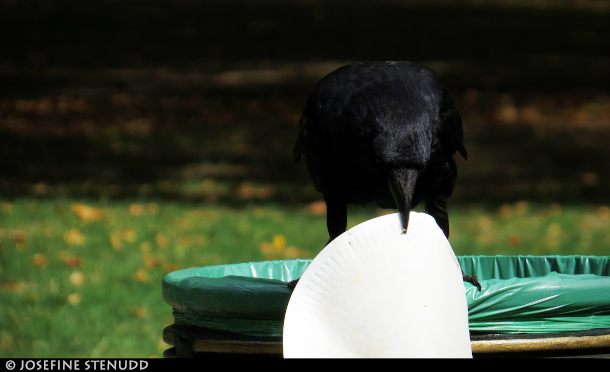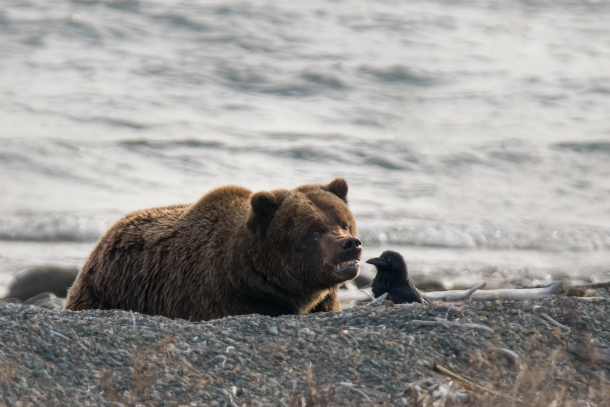Trying to Train Crows
Air Date: Week of August 7, 2020

Most wild Rooks are more likely to take garbage OUT of the can. (Photo: Josefine S., Flickr, CC BY-NC-ND 2.0)
Almost everywhere humans are found, so are crows and other corvids. These intelligent birds have found ways to take advantage of the habitats that humans create, and find food and shelter in the shadows and margins. And some members of our own species have seized upon the idea that crows might be taught to help collect litter in exchange for food rewards. Living on Earth’s Isaac Merson takes a look at the viability of these crow-cleaning schemes.
Transcript
CURWOOD: The animal species that share our cities and suburbs and are able to adapt to living near humans are often called pests. Crows are often noisy and sometimes annoying, but they are among the smartest birds. So some crow entrepreneurs are looking at ways to train them to actually help clean up our city streets. Living on Earth’s Isaac Merson has our story.
MERSON: Six crows circle, deep black against the bright sky.
[SFX Rook calls, from the the Macaulay Library]
MERSON: One flies lower, lands, cocks her head, and dips her bill to snatch up a cigarette butt, a tiny piece of plastic litter containing as many as 250 toxic chemicals. The crow flies to an intricate mahogany box and deposits the cigarette butt. Her Trainer pulls a drawer out, with a tasty treat inside. The crow scarfs her snack and takes to the skies in search of more treasured trash.
Large-billed crows in Japan are no strangers to using humans to grab an easy meal. (Photo: Isaac Merson)
[SFX Rook wing sounds from the Macaulay Library ]
MERSON: Our heroine is one of six rooks trained by Christophe Gaborit at the Puy du Fou theme park in France to pick up litter in return for a delicious snack. This winged troop swoops and scoops, black eyes full of glee and trickery. Think of the possibilities this suggests! A corvid army of crows cleaning our streets, collecting loose change, sorting our recycling, spit shining our sidewalks.
[SFX Chorus of crow sounds from the Macaulay Library ]
Crows live on every continent except Antarctica. Their global distribution is a testament to their ability to problem solve; here a Pied Crow stalks the grasses of Northern Tanzania. (Photo: Isaac Merson)
MERSON: We know that crows are smart, they learn from one another, and can even pass knowledge down from one generation to the next. They make and use tools include ing busy roadways to crack walnuts. And some Large-billed crows in Japan have been found building indestructible nests from discarded coat-hangers. In a TED talk technologist Josh Klein, talked about the idea that crows might be convinced to help clean up the messes that we make:
KLEIN: I think that crows can be trained to do other things, for example, why not train them to pick up garbage after stadium events or find expensive components from discarded electronics?
Crows have even found their way to small pacific islands, like this Mariana Crow, one of fewer than 200 individuals remaining from its species. (Photo: Isaac Merson)
MERSON: And the internet is chock full of wild speculation about the future possibilities suggested by the staged presentations in France. One dutch start-up, called Crowded Cities, spent several years developing a combination trash can and automatic food dispenser called the Crowbar which would reward wild crows with peanuts or food pellets upon successful deposit of a cigarette filter. But research suggests wild Crows probably don’t want to do our dirty work for peanuts. In fact, not one single experiment with wild crows has been able to document a desire to trade trash for rewards. According to corvid expert Dr. Jennifer Campbell Smith, any kind of training like this would most likely only work with captive crows, who are receptive to training primarily because they get bored and want to play.
CAMPBELL-SMITH: These are animals that don't have to worry about where their next meal comes from. They don't really have to worry about predators. So they get bored. They need cognitive stimulation, and they're quite open to training. Wild crows are a generalist forger that is having to look out for predators, that is having to worry about where its next meal comes from. And honestly, it has easy access to food from sidewalks dumpsters landfills. Honestly, there's plenty of insects in the grass. peanuts and food pellets really wouldn't justify the time and risk that they would have to give up in order to clean up trash for us.
MERSON: So perhaps wild crows aren’t the street cleaners of tomorrow. Perhaps we need to find ways to coexist by thinking less like a human, and more like a crow. After all, there’s no getting away from our fellow intelligent generalists, they’re already using humans to supply a lot of their food, taking free lunch from landfills, roadkills, and take-out spills, and using the trees we plant in our suburbs for shelter. When we look at a crow and see an opportunity to exploit, the crow is staring right back at us. And if we think like a crow, we may stand to benefit: healthy relationships between humans and corvids exist, and have for a long time: Alaskan Athabascan and Inupiac peoples follow the gurgling calls of ravens to find game, and leave the carcass for the raven in return. And that’s something to crow about.

Not all inter-species hunting relationships are cordial; here a grizzly warns away a hungry raven from a sheep carcass. (Photo: Keith Williams, Flickr, CC BY-NC 2.0)
[SFX: Crow sounds from the Macaulay Library ]
MERSON: For Living on Earth, I’m Isaac Merson.
Links
Watch the Puy du Fou crows in action
Read more about some of the different ways people of the world regard crows
Living on Earth wants to hear from you!
Living on Earth
62 Calef Highway, Suite 212
Lee, NH 03861
Telephone: 617-287-4121
E-mail: comments@loe.org
Newsletter [Click here]
Donate to Living on Earth!
Living on Earth is an independent media program and relies entirely on contributions from listeners and institutions supporting public service. Please donate now to preserve an independent environmental voice.
NewsletterLiving on Earth offers a weekly delivery of the show's rundown to your mailbox. Sign up for our newsletter today!
 Sailors For The Sea: Be the change you want to sea.
Sailors For The Sea: Be the change you want to sea.
 The Grantham Foundation for the Protection of the Environment: Committed to protecting and improving the health of the global environment.
The Grantham Foundation for the Protection of the Environment: Committed to protecting and improving the health of the global environment.
 Contribute to Living on Earth and receive, as our gift to you, an archival print of one of Mark Seth Lender's extraordinary wildlife photographs. Follow the link to see Mark's current collection of photographs.
Contribute to Living on Earth and receive, as our gift to you, an archival print of one of Mark Seth Lender's extraordinary wildlife photographs. Follow the link to see Mark's current collection of photographs.
 Buy a signed copy of Mark Seth Lender's book Smeagull the Seagull & support Living on Earth
Buy a signed copy of Mark Seth Lender's book Smeagull the Seagull & support Living on Earth

